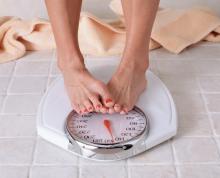Do You Need to Break up with Your Scale?

My once-beloved scale currently sits on a top shelf in a dusty corner of my garage, under a broken toaster oven and a portable cooler. When I stashed it there several months ago, I wanted to make it too inconvenient to retrieve in a moment of weakness. And I’ve been healthier and happier ever since.
So much conflicting advice exists about monitoring your weight. Some experts advise us to regularly weigh ourselves to stay in the “proper range” or promote weight loss. (For example, this Psychology Today post or this Men’s Health post.) Others say to avoid it completely, lest we become obsessive or binge eat in response to a disappointing number. (Check out this US News & World Report article or this Huffington Post piece.)
Only you can know what’s the right approach for you, but I’ll confess it took me a while to figure it out for myself.
When I lost weight a few years ago, I was a slave to my scale. I weighed myself several times a day, constantly evaluating the impact of, say, different meals, too much water versus not enough water, or an extra long run. I was afraid that less frequent weigh-ins would result in huge disappointment if I was simply carrying around an extra couple of pounds that would have been gone within a day. And the constant stream of information was motivating.
When I reached the lowest weight of my adulthood, it was one of the happiest, proudest times of my life. But I associated those positive feelings with the number on the scale, rather than to all of the wonderful things I was doing to take care of my mind, body, and spirit.
Like so many of us who’ve lost weight, I didn’t stay at the lowest point. According to the scale, I rebounded up several pounds during the following year. But here’s the kicker: I never would have known that I had gained a few pounds if I had simply stayed off the scale. All of my jeans still fit. Other than a couple of clingy skirts becoming a bit too snug, but nothing else in my life had changed.
Although my body was essentially the same, the number on the scale changed everything in my head. I became overly fearful of putting the weight back on, and thus spent months ping-ponging between depriving myself and overeating. Feelings of frustration and anxiety ruled most days. I had fallen out of balance and was engaging in all manner of self-defeating behaviors. All because of a few measly pounds.
The scale led me to believe I was failing at my new, healthier lifestyle. I had attached so much contentment and confidence to that record-breaking number that when the number increased a bit, I no longer felt content or confident. I believed that contentment and confidence would return only if the number on the scale did, too. Even though I was coaching my clients with sincerity and commitment, that the number on the scale was irrelevant and ultimately uncontrollable, I was letting it dictate my own happiness. Shame on me.
So the scale was banished to the garage. These days, I joyfully have no clue how much I weigh. But here’s what I do know:
- My jeans still fit.
- My eating habits are coming back into balance.
- When I proudly turned my back to the scale at the doctor’s office, the nurse gave me a smile and an “amen.”
- I’m focusing again on enjoying walks and yoga classes, and having dance parties with my kids, rather than punishing my body with excessive running.
If you’ve found yourself anxious or stressed about your weight, consider taking an indefinite break from your scale. Allow yourself to focus on behaviors and lifestyle changes, not fickle numbers. Pay attention to nurturing your body, giving it permission to weigh whatever it needs to at any given moment. (This is particularly necessary for folks recovering from adrenal dysfunction or hypoactive thyroids; the body needs time to heal.)
The more trust you have in your body, the more trust you will have in yourself, and the more holistically healthy you will be. That says more than the damn scale ever could.
Add comment